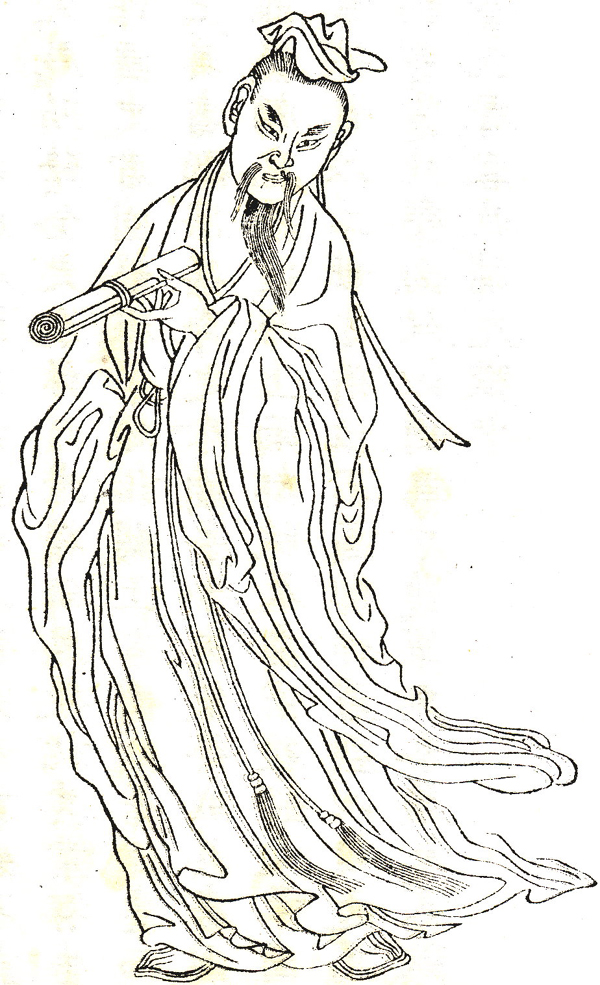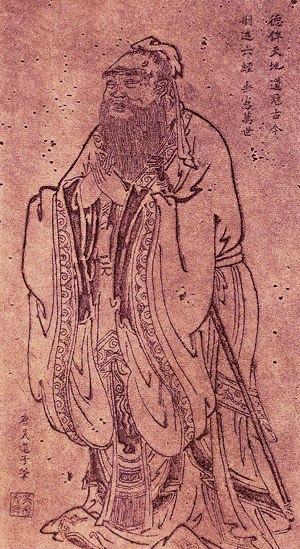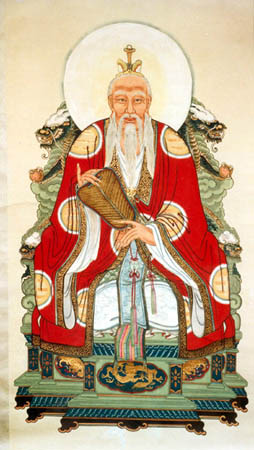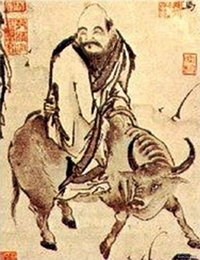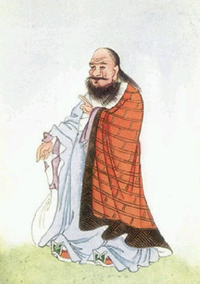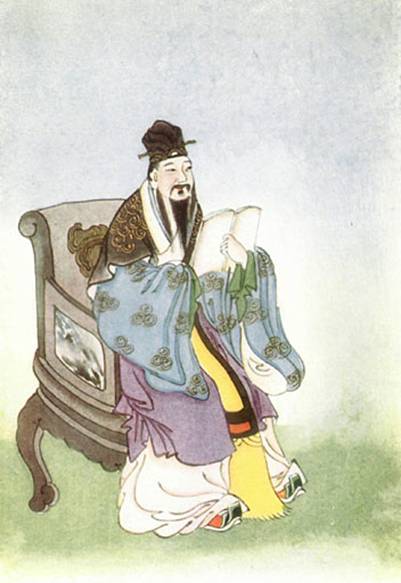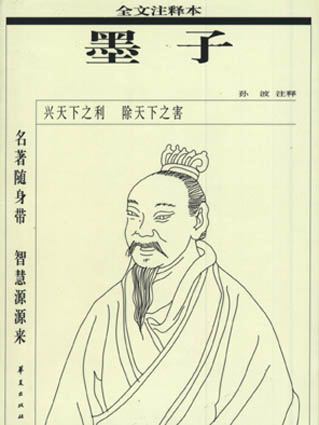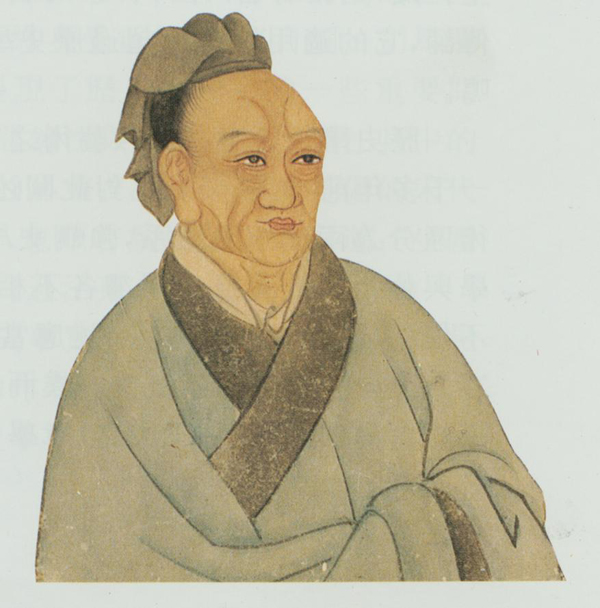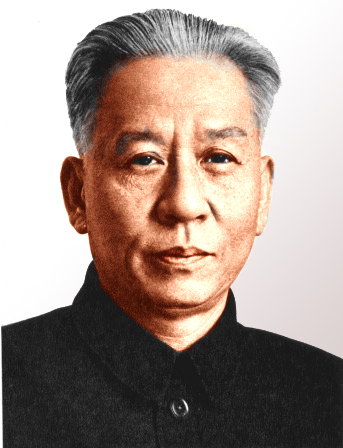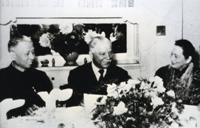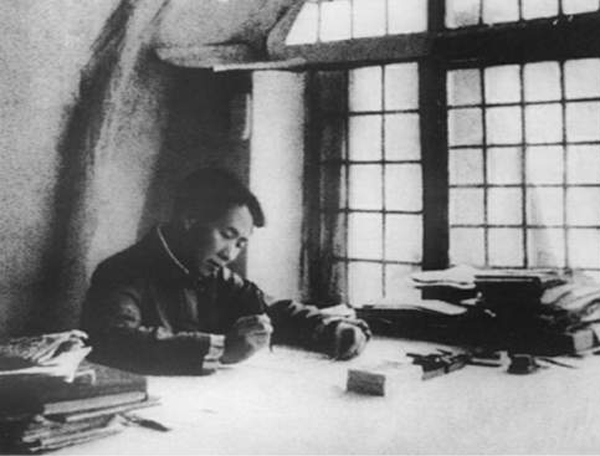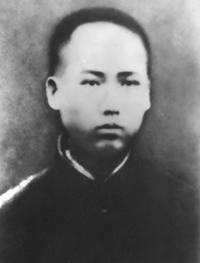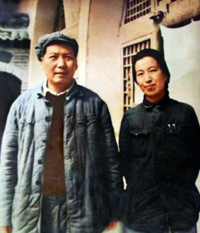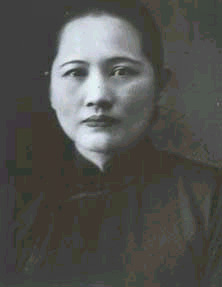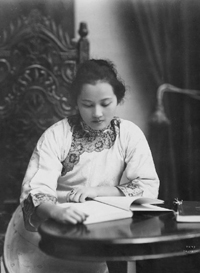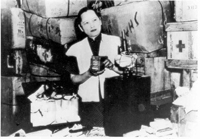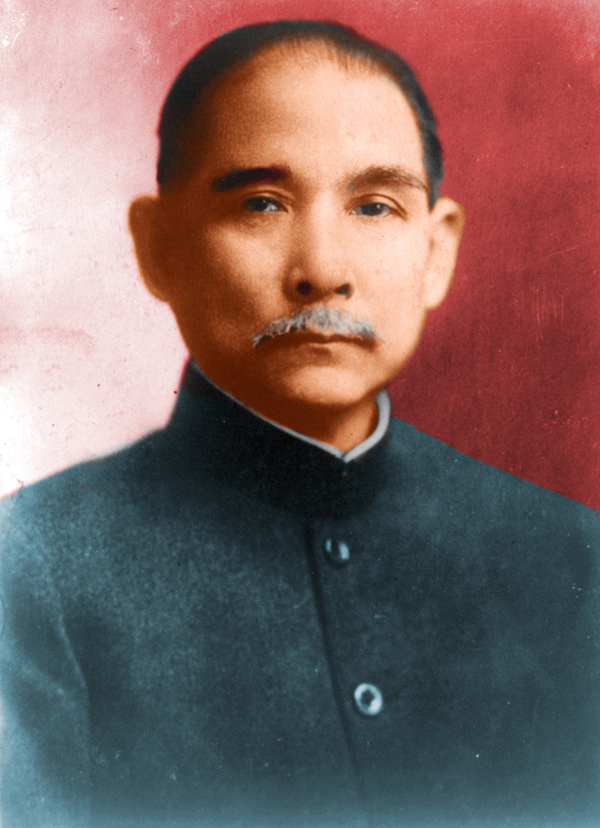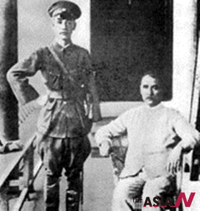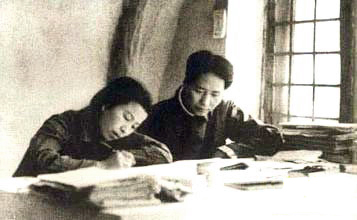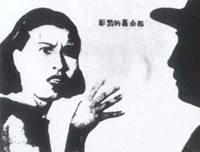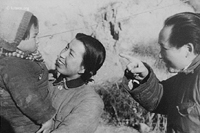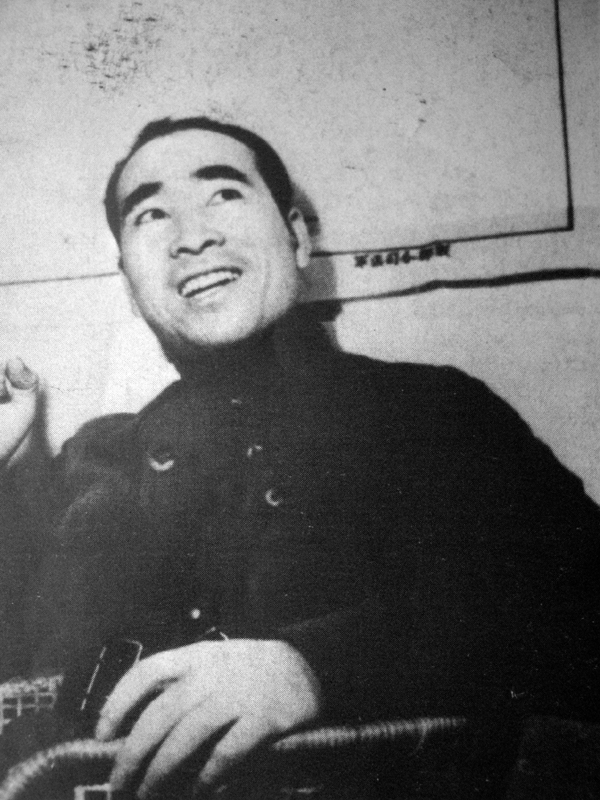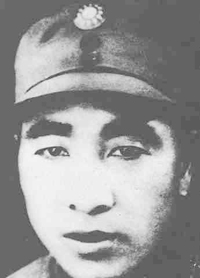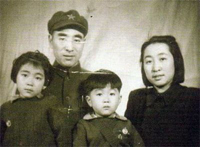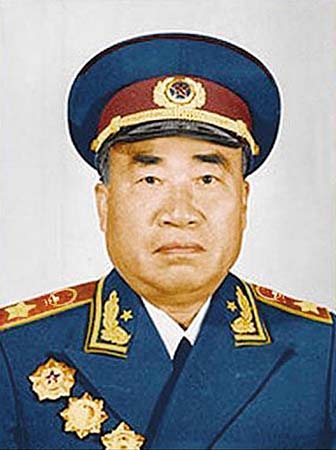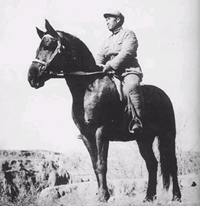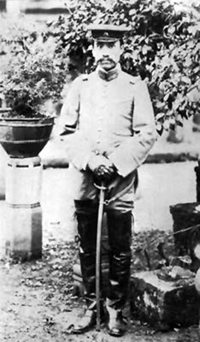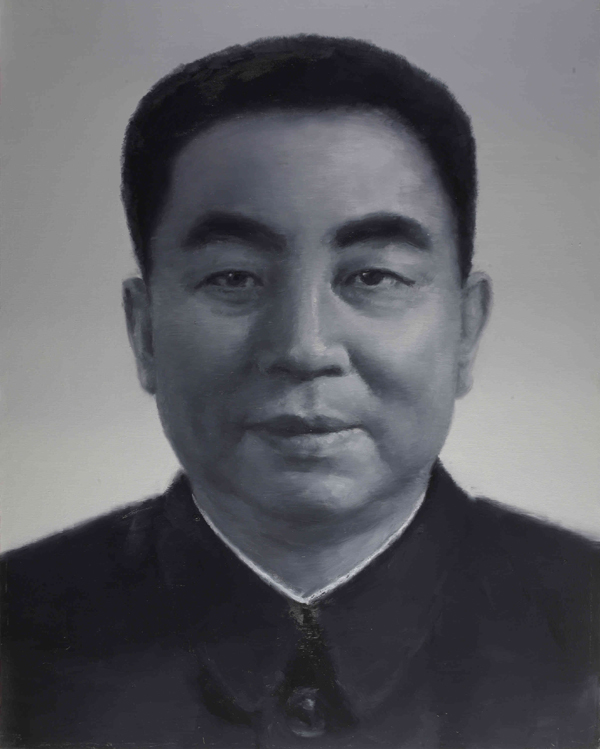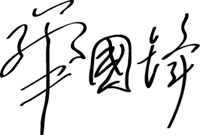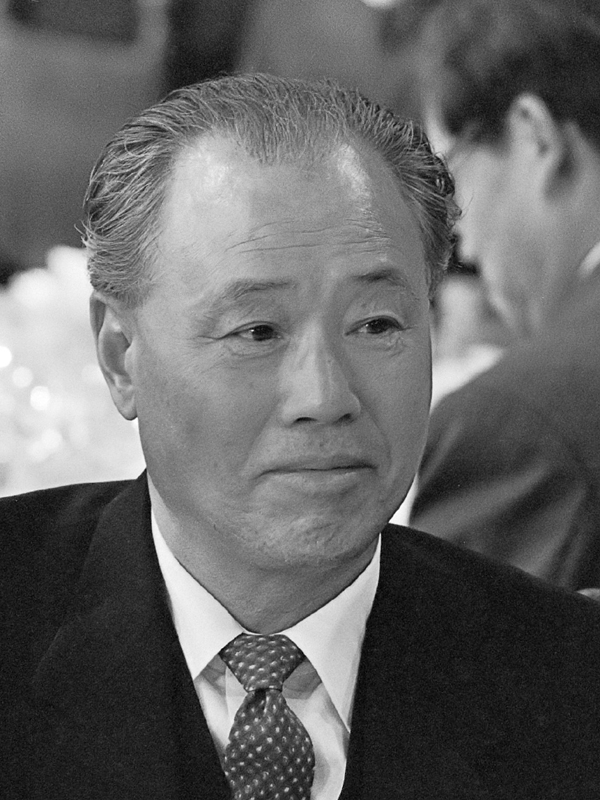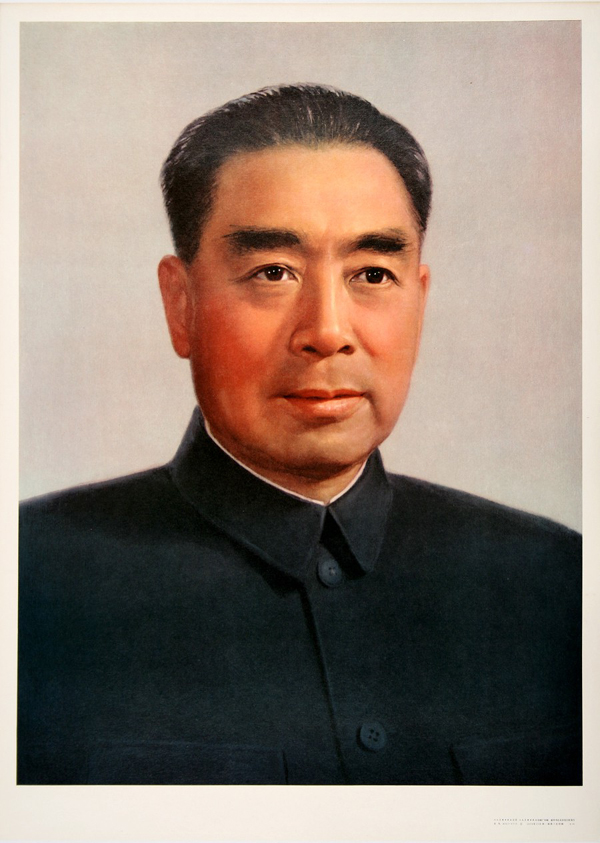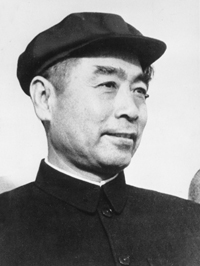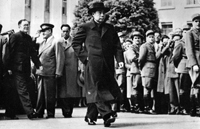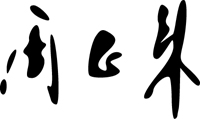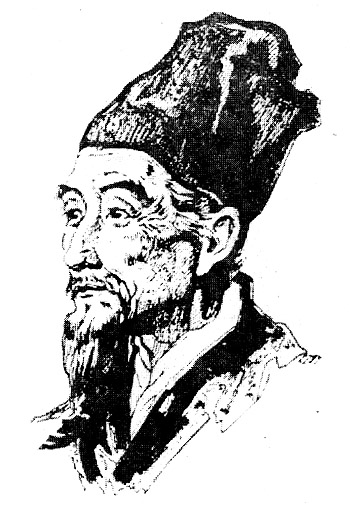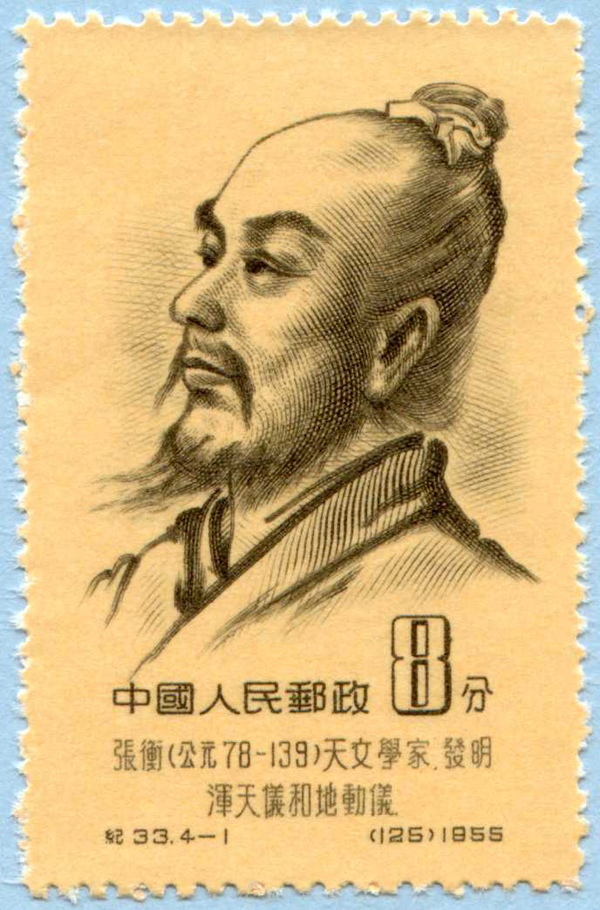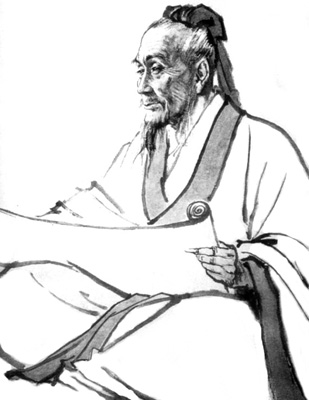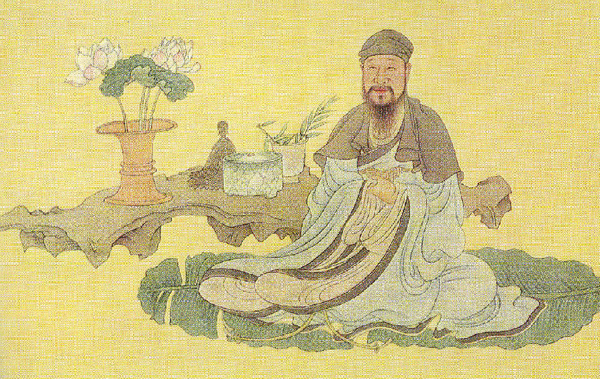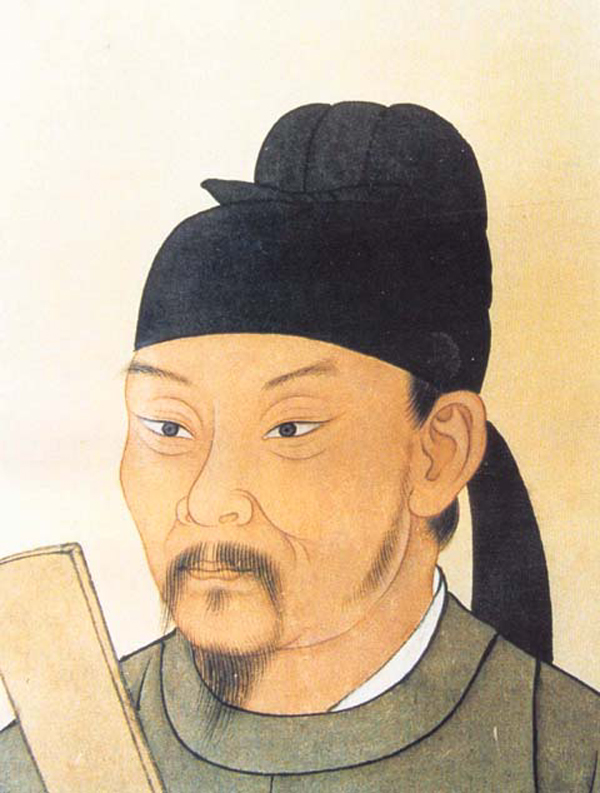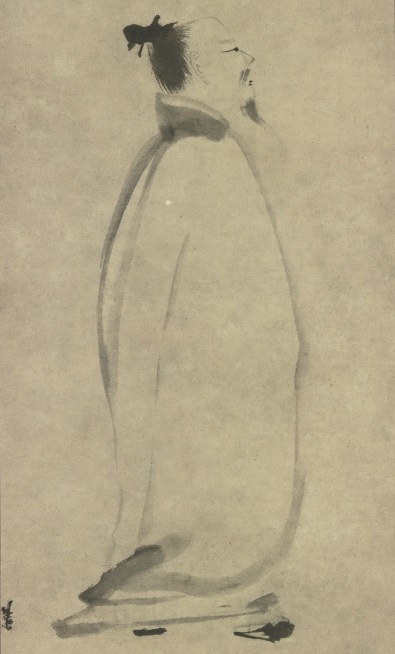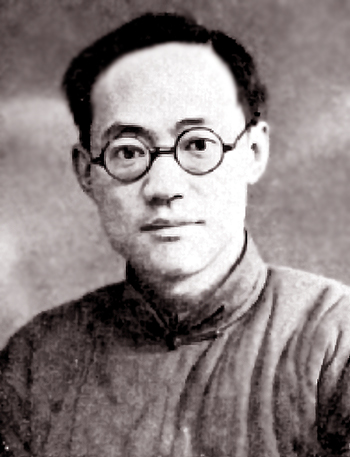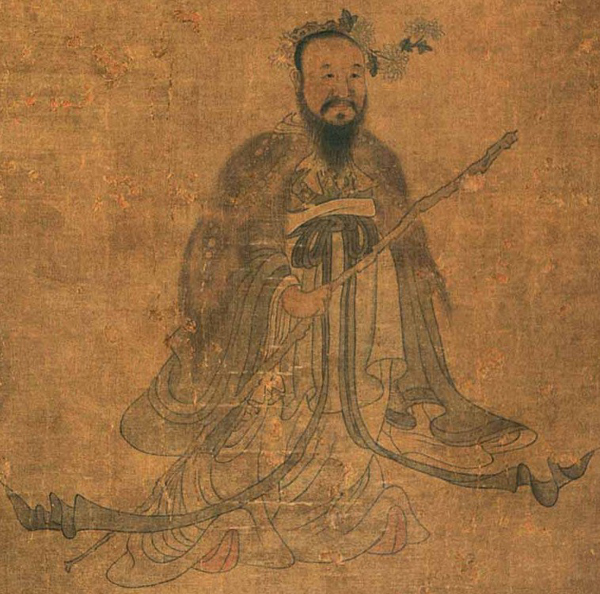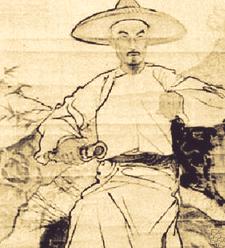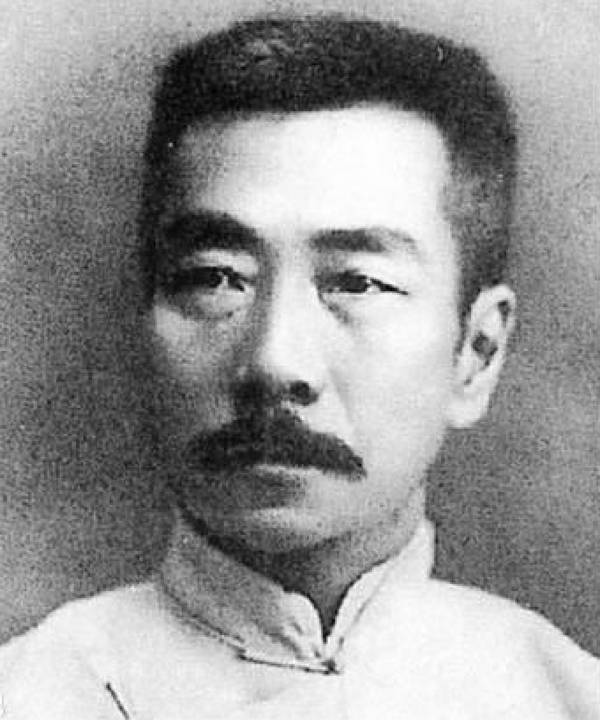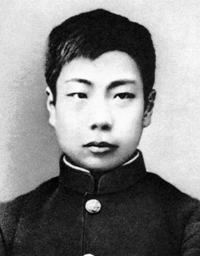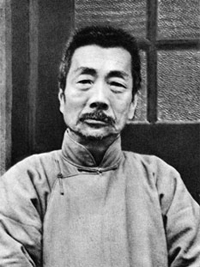History
Academics and Intellectuals
Ban Gu
Known For:
Compiled the Book of HanBan Gu (Pan Ku, AD 32–92) wrote Qian Hanshu (Ch'ien-Han shu; History of the Former Han Dynasty), a continuation of Sima Qian's work.Ban Gu (Chinese: 班固; Wade–Giles: Pan Ku; AD 32–92), courtesy name Mengjian (孟堅), was a 1st-century Chinese historian and poet best known for his part in compiling the Book of Han. He also wrote a number of fu, a major literary form, part prose and part poetry, which is particularly associated with the Han era. A number of Ban's fu are anthologized by Xiao Tong in the Wen Xuan.
Country: China
Date of Birth: AD 32
Place of Birth: Anling, Fufeng County, Han Dynasty
Date of Death: AD 92
Please of Death: unlisted
Confucius
Known For: Philosophy emphasizing personal and governmental morality, correctness of social relationships, justice and sincerityConfucius (K'ung Fu-tzu or Kong Fuzi, 551–479 BC ) is generally regarded as the most important historical figure, as well as the greatest scholar, of ancient China. His philosophy and social ideas include observance of filial piety, the sanctity of the family, and social responsibility.Confucius (/kənˈfjuːʃəs/; 551–479 BC)[1] was a Chinese teacher, editor, politician, and philosopher of the Spring and Autumn period of Chinese history. The philosophy of Confucius emphasized personal and governmental morality, correctness of social relationships, justice and sincerity. His followers competed successfully with many other schools during the Hundred Schools of Thought era only to be suppressed in favor of the Legalists during the Qin Dynasty. Following the victory of Han over Chu after the collapse of Qin, Confucius's thoughts received official sanction and were further developed into a system known as Confucianism. Confucius is traditionally credited with having authored or edited many of the Chinese classic texts including all of the Five Classics, but modern scholars are cautious of attributing specific assertions to Confucius himself. Aphorisms concerning his teachings were compiled in the Analects, but only many years after his death. Confucius's principles had a basis in common Chinese tradition and belief. He championed strong family loyalty, ancestor worship, respect of elders by their children and of husbands by their wives. He also recommended family as a basis for ideal government. He espoused the well-known principle "Do not do to others what you do not want done to yourself", an early version of the Golden Rule.
Country: China
Date of Birth: 551 BC
Place of Birth: Zou, Lu state
Date of Death: 479 BC
Please of Death: Lu State
Lao-Tzu
Known For:
Founder of philosophical TaoismOther early philosophers were Lao-tzu (Laozi; Li Erh, 604?–531 BC ), the traditional founder of Taoism; Mencius (Meng-tzu or Mengzi, 385–289 BC ), who stressed the essential goodness of human nature and the right of subjects to revolt against unjust rulers; and Mo Ti (Di, 465?–390? BC ), who stressed the theme of universal love.Laozi (also Lao-Tzu /ˈlaʊˈdzʌ/[1] or Lao-Tze) was a philosopher and poet of ancient China. He is best known as the reputed author of the Tao Te Ching[2] and the founder of philosophical Taoism, but he is also revered as a deity in religious Taoism and traditional Chinese religions. Although a legendary figure, he is usually dated to around the 6th century BC and reckoned a contemporary of Confucius, but some historians contend that he actually lived during the Warring States period of the 5th or 4th century BC.[3] A central figure in Chinese culture, Laozi is claimed by both the emperors of the Tang dynasty and modern people of the Li surname as a founder of their lineage. Throughout history, Laozi's work has been embraced by various anti-authoritarian movements.[4]
Country: China
Date of Birth: 571 BCE
Place of Birth: unknown
Date of Death: unknown
Please of Death: unknown
Meng Ke
Known For: Confucian philosophyOther early philosophers were Lao-tzu (Laozi; Li Erh, 604?–531 BC ), the traditional founder of Taoism; Mencius (Meng-tzu or Mengzi, 385–289 BC ), who stressed the essential goodness of human nature and the right of subjects to revolt against unjust rulers; and Mo Ti (Di, 465?–390? BC ), who stressed the theme of universal love.Mencius (/ˈmɛnʃiəs/;[5] Chinese: 孟子; pinyin: Mèng Zǐ; Wade–Giles: Meng4 Tzu3; Zhuyin Fuhao: ㄇㄥˋ ㄗˇ; most accepted dates: 372 – 289 BC; other possible dates: 385 – 303/302 BC) was a Chinese philosopher who is the most famous Confucian after Confucius himself.[6]
Country: China
Date of Birth: ca. 372 BC
Place of Birth: State of Zou
Date of Death: ca. 289 BC
Please of Death: Zoucheng
Mo Di
Known For: Founder of MohismOther early philosophers were Lao-tzu (Laozi; Li Erh, 604?–531 BC ), the traditional founder of Taoism; Mencius (Meng-tzu or Mengzi, 385–289 BC ), who stressed the essential goodness of human nature and the right of subjects to revolt against unjust rulers; and Mo Ti (Di, 465?–390? BC ), who stressed the theme of universal love.Mozi (Chinese: 墨子; pinyin: Mòzǐ; Wade–Giles: Mo Tzu, Lat. as Micius, ca. 470 BC – ca. 391 BC), original name Mo Di (墨翟), was a Chinese philosopher during the Hundred Schools of Thought period (early Warring States period). Born in Tengzhou, Shandong Province, China, he founded the school of Mohism and argued strongly against Confucianism and Daoism. His philosophy emphasized self-restraint, self-reflection and authenticity rather than obedience to ritual. During the Warring States period, Mohism was actively developed and practiced in many states but fell out of favour when the legalist Qin Dynasty came to power. During that period, many Mohist classics were ruined when emperor Qin Shi Huang carried out the burning of books and burying of scholars. The importance of Mohism further declined when Confucianism became the dominant school of thought during the Han Dynasty, until mostly disappearing by the middle of the Western Han Dynasty.[1] Mozi is known by children throughout Chinese culture by way of the Thousand Character Classic, which records that he was saddened when he saw dyeing of pure white silk, which embodied his conception of austerity (simplicity, chastity). For the modern juvenile audience of Chinese speakers the image of his school and its founder was popularized by the animated TV series The Legend of Qin.
Country: China
Date of Birth: ca. 470 BC
Place of Birth: State of Lu
Date of Death: ca. 391 BC
Please of Death: unknown
Sima Qian
Known For: Records of the Grand HistorianSima Qian (Ssu-ma Ch'ien, 145–87 BC ) produced the monumental Shiji (Shih-chi; Historical Records), the first general history of China.Sima Qian (c. 145 or 135 – 86 BC), formerly romanized Ssu-ma Chien, was a Chinese historian of the Han dynasty. He is considered the father of Chinese historiography for his work, the Records of the Grand Historian, a Jizhuanti-style (history presented in a series of biographies) general history of China, covering more than two thousand years from the Yellow Emperor to his time, during the reign of Emperor Wu of Han. Although he worked as the Court Astrologer (Chinese: 太史令; Tàishǐ Lìng), later generations refer to him as the Grand Historian (Chinese: 太史公; Tàishǐ Gōng or tai-shih-kung) for his monumental work; a work which in later generations would often only be somewhat tacitly or glancingly acknowledged as an achievement only made possible by his acceptance and endurance of punitive actions against him, including imprisonment, castration, and subjection to servility.
Country: China
Date of Birth: ca. 145 or 135 BC
Place of Birth: Longmen, Han China
Date of Death: 86 BC
Please of Death: unknown
Activists and Revolutionaries
Liu Shaoqi
Known For: President of the People's Republic of China (28 April 1959 – 31 October 1968), Chairman of the Standing Committee of the National People's Congress (September 15, 1956 – April 28, 1957), Vice Chairman of the Communist Party of China (28 September 1956 – 1 August 1966), Member of the National People's Congress (15 September 1954 – 21 October 1968)Other prominent Chinese Communist leaders include Zhu De (Chu Teh, 1886–1976), who became commander in chief of the Red Army in 1931 and chairman of the Standing Committee of the NPC; Zhou Enlai (Chou En-lai, 1898–1976), first premier of China's State Council; Liu Shaoqi (Shao-ch'i, 1898–1969), who became China's head of state in 1959 and was purged during the Cultural Revolution but posthumously rehabilitated in 1985; and Lin Biao (Piao, 1908–71), who became deputy premier and minister of defense in 1959 and who, prior to his death and subsequent political vilification, had been certified as Mao's successor in the constitution drawn up in 1969.Liu Shaoqi (Chinese: 刘少奇; pinyin: Liú Shàoqí; IPA: [ljǒʊ ʂɑ̂ʊtɕʰǐ]; 24 November 1898 – 12 November 1969) was a Chinese revolutionary, statesman, and theorist. He was Chairman of the NPC Standing Committee from 1954 to 1959 and President of the People's Republic of China, China's head of state, from 1959 to 1968, during which he implemented policies of economic reconstruction in China. Initially groomed to be the successor to Chairman Mao Zedong, Liu antagonized Mao in the late 1960s during the Cultural Revolution and was criticized, then purged, by Mao. Liu disappeared from public life in 1968 and was labelled the "commander of China's bourgeoisie headquarters", China's foremost 'capitalist-roader', and a traitor to the revolution. He died under harsh treatment in late 1969, but was posthumously rehabilitated by Deng Xiaoping's government in 1980 and granted a national memorial service.
Country: China
Date of Birth: 24 November 1898
Place of Birth: Ningxiang, Hunan, Qing Empire
Date of Death: 12 November 1969
Please of Death: Kaifeng, Henan, People's Republic of China
Spouse: Wang Guangmei
Mao Zedong
Known For: 1st Chairman of the Central Committee of the Communist Party of China (June 19, 1945 – September 9, 1976), 1st Chairman of the Central Politburo of the Communist Party of China (March 20, 1943 – April 24, 1969), Chairman of the CPC Central Military Commission (August 23, 1945 – 1949 and September 8, 1954 – September 9, 1976), 1st Chairman of the National Committee of the CPPCC (September 21, 1949 – December 25, 1954), Honorary Chairman of the National Committee of the CPPCC (December 25, 1954 – September 9, 1976), 1st Chairman of the People's Republic of China (September 27, 1954 – April 27, 1959), Member of the National People's Congress (September 15, 1954 – April 18, 1959 and December 21, 1964 – September 9, 1976)Mao Zedong (Tse-tung, 1893–1976), the foremost figure of postrevolutionary China, served as chairman of the Central Committee of the CCP from 1956 to 1976.Mao Zedong (Listeni/ˈmaʊ zəˈdʊŋ, dzə-/), also transliterated as Mao Tse-tung and commonly referred to as Chairman Mao (December 26, 1893 – September 9, 1976), was a Chinese Communist revolutionary and the founding father of the People's Republic of China, which he governed as Chairman of the Communist Party of China from its establishment in 1949 until his death in 1976. His Marxist-Leninist theories, military strategies and political policies are collectively known as Marxism-Leninism-Maoism or Mao Zedong Thought.
Country: China
Date of Birth: 26 December 1893
Place of Birth: Shaoshan, Hunan, Qing Dynasty
Date of Death: 9 September 1976
Please of Death: Beijing
Spouse: Luo Yixiu (1907–1910), Yang Kaihui (1920–1930), He Zizhen (1930–1937), Jiang Qing (1939–1976)
Song Qingling
Known For: Honorary President of the People's Republic of China (16 May 1981 – 28 May 1981), Vice President of the People's Republic of China (27 April 1959 – 17 January 1975), Vice Chairperson of the 4th and 5th Standing Committee of the National People's Congress (17 January 1975 – 28 May 1981), Vice Chairperson of the 1st Standing Committee of the National People's Congress (27 September 1954 – 26 April 1959), Member of the 1st-5th National People's Congress (15 September 1954 – 28 May 1981), Vice Chairperson of the Central People's Government (1 October 1949 – 26 September 1954)Women in the political hierarchy have included Song Qingling (Soong Ch'ing-ling, 1892–1981), Sun Zhongshan's wife, and Jiang Qing (Chiang Ch'ing, 1913–1991), Mao's fourth wife, who emerged as a radical leader during the Cultural Revolution.Soong Ching-ling or Song Qingling (27 January 1893 – 29 May 1981) was the second wife of Sun Yat-sen, leader of the 1911 revolution that established the Republic of China, and was often referred to as Madame Sun Yat-sen. She was a member of the Soong family and, together with her siblings, played a prominent role in China's politics prior to 1949. She has become known as the "mother of modern China".[1] After the establishment of the People's Republic of China in 1949, she held several prominent positions in the new government, including Vice President of China, traveled abroad during the early 1950s, representing it at a number of international activities. During the Cultural Revolution, however, she was heavily criticized; in one incident in 1966, her parents' grave was destroyed by Red Guards.[2] Soong survived the Cultural Revolution, but appeared less frequently after 1976. During her final illness in May 1981, she was given the special title of Honorary President of the People's Republic of China.
Country: China
Date of Birth: 27 January 1893
Place of Birth: Shanghai, Qing Empire
Date of Death: 29 May 1981
Please of Death: Beijing, People's Republic of China
Spouse: Sun Yat-sen
Sun Wen, Sun Deming
Known For: Provisional President of the Republic of China (1 January 1912 – 10 March 1912), Premier of the Kuomintang of China (10 October 1919 – 12 March 1925)Sun Yat-sen (Zhongshan or Chung-shan, 1866–1925) planned the revolution against the Manchus and became the first president (1911–12) of the republic.Sun Yat-sen (/ˈsʊn ˈjɑːtˈsɛn/; 12 November 1866 – 12 March 1925)[1][2] was a Chinese revolutionary, first president and founding father of the Republic of China (1912–49), and medical practitioner. As the foremost pioneer of the Republic of China, Sun is referred to as the "Father of the Nation" in the Republic of China (ROC), and the "forerunner of democratic revolution" in the People's Republic of China. Sun played an instrumental role in the overthrow of the Qing dynasty during the years leading up to the Double Ten Revolution. He was appointed to serve as Provisional President of the Republic of China, when it was founded in 1912. He later co-founded the Kuomintang (KMT), serving as its first leader.[3] Sun was a uniting figure in post-Imperial China, and remains unique among 20th-century Chinese politicians for being widely revered amongst the people from both sides of the Taiwan Strait. Although Sun is considered one of the greatest leaders of modern China, his political life was one of constant struggle and frequent exile. After the success of the revolution, he quickly resigned, due to Beiyang Clique pressure, from his post as President of the newly founded Republic of China, and led successive revolutionary governments as a challenge to the warlords who controlled much of the nation. Sun did not live to see his party consolidate its power over the country during the Northern Expedition. His party, which formed a fragile alliance with the Communists, split into two factions after his death. Sun's chief legacy resides in his developing of the political philosophy known as the Three Principles of the People: nationalism, democracy, and the people's livelihood.[4]
Country: China
Date of Birth: 12 November 1866
Place of Birth: Xiangshan County, Guangdong
Date of Death: 12 March 1925
Please of Death: Beijing
Spouse: Lu Muzhen (1885–1915), Kaoru Otsuki (1903–1906), Soong Ching-ling (1915–1925)
Movie, Film, TV, & Theater
Jiang Qing
Known For: Spouse of the President of the People's Republic of China (1 October 1949 – 27 April 1959)Women in the political hierarchy have included Song Qingling (Soong Ch'ing-ling, 1892–1981), Sun Zhongshan's wife, and Jiang Qing (Chiang Ch'ing, 1913–1991), Mao's fourth wife, who emerged as a radical leader during the Cultural Revolution.Jiang Qing[N 1] (Chinese: 江青; Wade–Giles: Chiang Ching, also known as Madame Mao; March 19, 1914 – May 14, 1991) was a Chinese actress and a major political figure during the Cultural Revolution. She was the wife of Mao Zedong, the Chairman of the Communist Party of China. She used the stage name Lan Ping (蓝苹) during her acting career, and was known by many other names (see "names" section below). She married Mao in Yan'an in November 1938 and served as the inaugural "first lady" of the People's Republic of China. Jiang Qing was best known for playing a major role in the Cultural Revolution (1966–76) and for forming the radical political alliance known as the "Gang of Four". Jiang Qing served as Mao's personal secretary in the 1940s and was head of the Film Section of the Communist Party's Propaganda Department in the 1950s. She served as an important emissary for Mao in the early stages of the Cultural Revolution. In 1966 she was appointed deputy director of the Central Cultural Revolution Group. She collaborated with Lin Biao to advance Mao's unique brand of Communist ideology as well as Mao's cult of personality. At the height of the Cultural Revolution, Jiang Qing held significant influence in the affairs of state, particularly in the realm of culture and the arts, and was idolized in propaganda posters as the "Great Flagbearer of the Proletarian Revolution". In 1969, Jiang gained a seat on the Politburo. Before Mao's death, the Gang of Four maintained control of many of China's political institutions, including the media and propaganda. However, Jiang Qing, deriving most of her political legitimacy from Mao, often found herself at odds with other top leaders. Mao's death in 1976 dealt a significant blow to Jiang Qing's political fortunes. She was arrested in October 1976 by Hua Guofeng and his allies, and was subsequently condemned by party authorities. Since then, Jiang Qing has been officially branded as having been part of the "Lin Biao and Jiang Qing Counter-Revolutionary Clique" (林彪江青反革命集团), to which most of the blame for the damage and devastation caused by the Cultural Revolution was assigned. Though initially sentenced to death, her sentence was commuted to life imprisonment in 1983. After being released for medical treatment, Jiang Qing committed suicide in May 1991.[1][2]
Country: China
Date of Birth: 19 March 1914
Place of Birth: Zhucheng, Shandong, China
Date of Death: 14 May 1991
Please of Death: Beijing, China
Spouse: Pei Minglun (m.1931), Tang Na (m.1936), Mao Zedong (m.1938, wid.1976)
Military Leaders
Lin Biao
Known For: First-ranking Vice Premier of the People's Republic of China (December 21, 1964 – September 13, 1971), Vice Chairman of the Communist Party of China (May 25, 1958 – September 13, 1971), Vice Premier of the People's Republic of China (15 September 1954 – 13 September 1971), Minister of National Defense (17 September 1959 – 13 September 1971)Other prominent Chinese Communist leaders include Zhu De (Chu Teh, 1886–1976), who became commander in chief of the Red Army in 1931 and chairman of the Standing Committee of the NPC; Zhou Enlai (Chou En-lai, 1898–1976), first premier of China's State Council; Liu Shaoqi (Shao-ch'i, 1898–1969), who became China's head of state in 1959 and was purged during the Cultural Revolution but posthumously rehabilitated in 1985; and Lin Biao (Piao, 1908–71), who became deputy premier and minister of defense in 1959 and who, prior to his death and subsequent political vilification, had been certified as Mao's successor in the constitution drawn up in 1969.Lin Biao (pinyin: Lín Biāo; Wade–Giles: Lin Piao; IPA: [lǐn pjɑ́ʊ]; December 5, 1907 – September 13, 1971) was a major Chinese Communist military leader who was pivotal in the communist victory in the Chinese Civil War, especially in Northeastern China. Lin was the general who commanded the decisive Liaoshen and Pingjin Campaigns, co-led the Manchurian Field Army of the People's Liberation Army into Beijing, and crossed the Yangtze River in 1949. He ranked third among the Ten Marshals. Zhu De and Peng Dehuai were considered senior to Lin, and Lin ranked directly ahead of He Long and Liu Bocheng. Lin abstained from taking an active role in politics after the civil war ceased in 1950. Lin lead a section of the government's civil bureaucracy as one of the co-serving Deputy Vice Premiers of the People's Republic of China from 1954 onwards, becoming First-ranked Vice Premier from 1964. Lin became more active in politics when named one of the co-serving Vice Chairmen of the Communist Party of China in 1958. He held the three responsibilities of Vice Premier, Vice Chairman and Minister of National Defense from 1959 onwards. Lin became instrumental in creating the foundations for Mao Zedong's cult of personality in the early 1960s, and was rewarded for his service in the Cultural Revolution by being named Mao's designated successor as the sole Vice Chairman of the Communist Party of China, from 1969 until his death. Lin died on 13 September 1971 when a plane he was aboard crashed in Mongolia. The Chinese government's official explanation is that Lin and his family attempted to flee following a botched coup against Mao. However, others have argued that they fled out of fear they would be purged, as Lin's relationship with other Communist Party leaders had soured in the final few years of his life. The exact events of this "Lin Biao incident" have been a source of speculation ever since. Following Lin's death, he was officially condemned as a traitor by the Communist Party of China. Lin and Mao's wife Jiang Qing (with her Gang of Four) were labeled the two major "counter-revolutionary forces" of the Cultural Revolution, receiving official blame from the Chinese government.
Country: China
Date of Birth: 5 December 1907
Place of Birth: Huanggang, Hubei, Qing Empire
Date of Death: 13 September 1971
Please of Death: Öndörkhaan, Mongolia
Spouse: Zhang Mei, Ye Qun
Zhu De
Known For: Chairman of the Standing Committee of the National People's Congress (April 1959 – July 1976), Vice Chairman of the People's Republic of China (September 27, 1954 – April 27, 1959), Vice Chairman of the Communist Party of China (28 September 1956 – 1 August 1966), Secretary of the Central Commission for Discipline Inspection (November, 1949 – March, 1955), Commander-in-Chief of the People's Liberation Army (November 28, 1946 – September 27, 1954), Member of the National People's Congress (15 September 1954 – 6 July 1976)Other prominent Chinese Communist leaders include Zhu De (Chu Teh, 1886–1976), who became commander in chief of the Red Army in 1931 and chairman of the Standing Committee of the NPC; Zhou Enlai (Chou En-lai, 1898–1976), first premier of China's State Council; Liu Shaoqi (Shao-ch'i, 1898–1969), who became China's head of state in 1959 and was purged during the Cultural Revolution but posthumously rehabilitated in 1985; and Lin Biao (Piao, 1908–71), who became deputy premier and minister of defense in 1959 and who, prior to his death and subsequent political vilification, had been certified as Mao's successor in the constitution drawn up in 1969.Zhu De (Chu Teh; pronounced [ʈʂú tɤ̌]; 1 December 1886 – 6 July 1976) was a Chinese general, warlord, politician, revolutionary, and one of the pioneers of the Chinese Communist Party. Born poor in 1886 in Sichuan, Zhu was adopted by a wealthy uncle at age nine; it was this prosperity earned him admission into a military academy. After his time at the academy, he joined a rebel army, and soon became a warlord. It was after this period that he adopted communism. He ascended through the ranks of the Red Army as it closed in on securing the nation. By the time China was under Mao's control, Zhu was a high-ranking official within the Communist Party of China. He served as Commander-in-Chief during the Second Sino-Japanese War. Zhu remained a prominent political figure until his death in 1976. After the founding of the People's Republic of China, in 1955 Zhu became one of the Ten Marshals of the People's Liberation Army, of which he is regarded as a principal founder.
Country: China
Date of Birth: 1 December 1886
Place of Birth: Yilong County, Sichuan, Qing Dynasty
Date of Death: 6 July 1976
Please of Death: Beijing, China
Spouse: Kang Keqing
Political Leaders
Hu Yaobang
Known For: General Secretary of the Central Committee of the Communist Party of China (11 September 1982 – 15 January 1987), 3rd Chairman of the Communist Party of China (28 June 1981 – 11 September 1982), Member of the National People's Congress (15 September 1954 – 15 April 1989), Secretary General of the CPC Central Secretariat (29 February 1980 – 12 September 1982), First Secretary of the Communist Youth League of China (June 1953 – August 1966)A protégé, Hu Yaobang (1915–1989), was party secretary until his ouster in 1987.Hu Yaobang (20 November 1915 – 15 April 1989) was a high-ranking official of the People's Republic of China. He achieved his most senior status within the Communist Party of China from 1981 to 1987, first as Party chairman from 1981 to 1982, then as General Secretary of the Communist Party from 1982 to 1987. Hu joined the Chinese Communist Party in the 1930s, and rose to prominence as a comrade of Deng Xiaoping. During the Cultural Revolution (1966–1976), Hu was purged, recalled, and purged again, following the political career of Deng. After Deng rose to power, following the death of Mao Zedong, Deng promoted Hu to a series of high political positions. Throughout the 1980s Hu pursued a series of economic and political reforms under the direction of Deng. Hu's political and economic reforms made him the enemy of several powerful Party elders, who opposed free market reforms and attempts to make China's government more transparent. When widespread student protests occurred across China in 1987, Hu's political opponents successfully blamed Hu for the disruptions, claiming that Hu's "laxness" and "bourgeois liberalization" had either led to, or worsened, the protests. Hu was forced to resign as Party general secretary, but was allowed to retain a seat in the Politburo. Hu's position as Party general secretary was taken by Zhao Ziyang, who continued many of Hu's economic and political reforms. A day after Hu's death, in 1989, a small-scale demonstration commemorated him and demanded that the government reassess his legacy. A week later, the day before Hu's funeral, some 100,000 students marched on Tiananmen Square, leading to the Tiananmen Square protests of 1989. Following the government's suppression of the 1989 protests, the Chinese government censored the details of Hu's life inside mainland China, but it officially rehabilitated his image and lifted its censorship restrictions on the 90th anniversary of Hu's birth, in 2005.
Country: China
Date of Birth: 20 November 1915
Place of Birth: Liuyang, Hunan, Beiyang Government
Date of Death: 15 April 1989
Please of Death: Beijing, China
Spouse: Li Zhao
Su Zhu
Known For: Chairman of the Central Committee of the Communist Party of China (7 October 1976 – 28 June 1981), Premier of the People's Republic of China (4 February 1976 – September 1980), Chairman of the CPC Central Military Commission (6 October 1976 – 28 June 1981), First Vice Chairman of the Communist Party of China (7 April 1976 – 7 October 1976)Jiang, with other prominent radicals, was purged in the wake of the ascension of Hua Guofeng (b.1920) as CCP chairman in 1976.Su Zhu (16 February 1921 – 20 August 2008), better known by the nom de guerre Hua Guofeng, was Mao Zedong's designated successor as the paramount leader and Premier of China, also the Chairman of the Communist Party of China. A regional official in Hunan between 1949 and 1971, he became the head of the party leadership in the province during the latter stages of the Cultural Revolution. Hua was elevated to the national stage in early 1976, and was known for his loyalty to Mao. Upon Zhou Enlai's death in January 1976, Hua succeeded Zhou as Premier of the People's Republic of China and First Vice Chairman of the Communist Party of China. After Mao's death, Hua took on the titles of Chairman of the Communist Party of China and the Chairman of the Central Military Commission, to the surprise and dismay of Jiang Qing and the rest of the Gang of Four. Hua is the only leader to have simultaneously held the three highest offices of China – leading the Communist Party, State Council and the Central Military Commission. On 6 October 1976, Hua brought the Cultural Revolution to an end and ousted the Gang of Four from political power by arranging for their arrests in Beijing. He attempted moderate reforms and reversing some of the excesses of Cultural Revolution-era policies. However, because of his insistence on continuing the Maoist line, he was himself outmaneuvered in December 1978 by Deng Xiaoping, a pragmatic reformer, who forced Hua into early retirement. As Hua faded into political obscurity, he continued to insist on the correctness of Maoist principles. He is remembered as a largely benign transitional figure in modern Chinese political history.
Country: China
Date of Birth: 16 February 1921
Place of Birth: Jiaocheng County, Shanxi
Date of Death: 20 August 2008
Please of Death: Beijing, People's Republic of China
Spouse: Han Zhijun
Zhao Ziyang
Known For: General Secretary of the Central Committee of the Communist Party of China (1 November 1987 – 23 June 1989), Premier of the People's Republic of China (10 September 1980 – 24 November 1987), Vice Chairman of the Communist Party of China (29 June 1981 – 12 September 1982)Another protégé, who emerged in 1987 as the likely preeminent Chinese leader of the future, although still currently in the political shadow of Deng, was Zhao Ziyang (b.1919), who became general secretary of the CCP in 1987; Li Peng (b.1928) was named premier in the same year.Zhao Ziyang (pronounced [ʈʂɑ̂ʊ tsɨ̀jɑ̌ŋ]; 17 October 1919 – 17 January 2005) was a high-ranking politician in China. He was the third Premier of the People's Republic of China from 1980 to 1987, Vice Chairman of the Communist Party of China from 1981 to 1982 and General Secretary of the Communist Party of China from 1987 to 1989. As a senior government official, Zhao was critical of Maoist policies and instrumental in implementing free-market reforms, first in Sichuan, subsequently nationwide. He emerged on the national scene due to support from Deng Xiaoping after the Cultural Revolution. He also sought measures to streamline China's bureaucracy and fight corruption, issues that challenged the Party's legitimacy in the 1980s. Zhao Ziyang was also an advocate of the privatization of state-owned enterprises, the separation of the Party and the state, and general market economic reforms. Many of these views were shared by then-general secretary Hu Yaobang.[2] His economic reform policies and sympathies to student demonstrators during the Tiananmen Square protests of 1989 placed him at odds with some members of the party leadership, including Premier Li Peng, former President Li Xiannian and Party elder Chen Yun. Zhao also began to lose favour with paramount leader Deng Xiaoping. In the aftermath of the events, Zhao was purged politically and effectively placed under house arrest for the next 15 years. In 2005, he died from a stroke in Beijing. Because of his political fall from grace, he was not given the funeral rites generally accorded to senior Chinese officials. His unofficial autobiography was published in English and in Chinese in 2009, but the details of his life remain censored inside mainland China.
Country: China
Date of Birth: 17 October 1919
Place of Birth: Hua County, Henan
Date of Death: 17 January 2005
Please of Death: Beijing, People's Republic of China
Spouse: Liang Boqi
Zhou Enlai
Known For: Premier of the People's Republic of China (1 October 1949 – 8 January 1976), Vice Chairman of the Communist Party of China (28 September 1956 – 1 August 1966 and 30 August 1973 – 8 January 1976), 2nd Chairman of the National Committee Of the CPPCC (December 1954 – 8 January 1976), 1st Foreign Minister of the PRC (1949–1958)Other prominent Chinese Communist leaders include Zhu De (Chu Teh, 1886–1976), who became commander in chief of the Red Army in 1931 and chairman of the Standing Committee of the NPC; Zhou Enlai (Chou En-lai, 1898–1976), first premier of China's State Council; Liu Shaoqi (Shao-ch'i, 1898–1969), who became China's head of state in 1959 and was purged during the Cultural Revolution but posthumously rehabilitated in 1985; and Lin Biao (Piao, 1908–71), who became deputy premier and minister of defense in 1959 and who, prior to his death and subsequent political vilification, had been certified as Mao's successor in the constitution drawn up in 1969.Zhou Enlai (5 March 1898 – 8 January 1976) was the first Premier of the People's Republic of China, serving from October 1949 until his death in January 1976. Zhou served under Mao Zedong and was instrumental in consolidating the control of the Communist Party's rise to power, forming foreign policy, and developing the Chinese economy. A skilled and able diplomat, Zhou served as the Chinese foreign minister from 1949 to 1958. Advocating peaceful coexistence with the West after the stalemated Korean War, he participated in the 1954 Geneva Conference, the 1955 Bandung Conference, and helped orchestrate Richard Nixon's 1972 visit to China. He helped devise policies regarding the bitter disputes with the U.S., Taiwan, the Soviet Union (after 1960), India and Vietnam. Zhou survived the purges of other top officials during the Cultural Revolution. With Mao dedicating most of his later years to political struggle and ideological work, Zhou was the main driving force behind the affairs of state during much of the Cultural Revolution. His attempts at mitigating the Red Guards' damage and his efforts to protect others from their wrath made him immensely popular in the Cultural Revolution's later stages. As Mao Zedong's health began to decline in 1971 and 1972, Zhou and the Gang of Four struggled internally over leadership of China. Zhou's health was also failing, however, and he died eight months before Mao on 8 January 1976. The massive public outpouring of grief in Beijing turned to anger towards the Gang of Four, leading to the Tiananmen Incident. Although succeeded by Hua Guofeng, it was Deng Xiaoping, Zhou's ally, who was able to outmaneuver the Gang of Four politically and eventually take Mao's place as Paramount leader by 1978.
Country: China
Date of Birth: 5 March 1898
Place of Birth: Huai'an, Jiangsu, Qing Dynasty
Date of Death: 8 January 1976
Please of Death: Beijing, China
Spouse: Deng Yingchao
Sciences: Architects, Engineers, Scientists, Physicians
Li Shizhen
Known For: Compendium of Materia Medica Li Shizhen (Shi-chen, 1518–93), an outstanding pharmacologist, wrote a monumental Materia Medica.Li Shizhen (Li Shih-chen; simplified Chinese: 李时珍; traditional Chinese: 李時珍; pinyin: Lǐ Shízhēn; Wade–Giles: Li3 Shih2-chen1, July 3, 1518 – 1593), courtesy name Dongbi (Tung-pi; Chinese: 東璧), was a Han Chinese polymath, medical doctor, scientist, pharmacologist, herbalist and acupuncturist of the Ming dynasty. His major contribution to clinical medicine was his 27-year work, which is found in his scientific book Compendium of Materia Medica (Bencao Gangmu). He is also considered to be the greatest scientific naturalist of China, and developed many innovative methods for the proper classification of herb components and medications to be used for treating diseases. The Bencao Gangmu is a huge medical encyclopedic text with 1,892 entries, each entry with its own name called a gang. The mu in the title refers to the synonyms of each name.[1] The book has details about more than 1,800 drugs (Chinese Medicine), including 1,100 illustrations and 11,000 prescriptions. It also described the type, form, flavor, nature and application in disease treatments of 1,094 herbs. His Compendium of Materia Medica has been translated into many different languages, and remains as the premier reference work for herbal medicine. His treatise included various related subjects such as botany, zoology, mineralogy, and metallurgy. The book was reprinted frequently and five of the original editions still exist.[2]
Country: China
Date of Birth: 1518
Place of Birth: Qizhou, Qichun County, Hubei
Date of Death: 1593
Please of Death: unknown
Zhang Heng
Known For: Seismometer, hydraulic-powered armillary sphere, pi calculation, poetry, universe model, lunar eclipse and solar eclipse theoryZhang (Chang) Heng (78–139), an astronomer, is credited with having invented the first seismograph.Zhang Heng (Chinese: t 張衡, s 张衡, p Zhāng Héng; AD 78–139), formerly romanized as Chang Hêng, was a Han Chinese polymath from Nanyang who lived during the Han dynasty. Educated in the capital cities of Luoyang and Chang'an, he achieved success as an astronomer, mathematician, scientist, engineer, inventor, geographer, cartographer, artist, poet, statesman, and literary scholar. Zhang Heng began his career as a minor civil servant in Nanyang. Eventually, he became Chief Astronomer, Prefect of the Majors for Official Carriages, and then Palace Attendant at the imperial court. His uncompromising stances on certain historical and calendrical issues led to Zhang becoming a controversial figure, which prevented him from rising to the status of Grand Historian. His political rivalry with the palace eunuchs during the reign of Emperor Shun (r. 125–144) led to his decision to retire from the central court to serve as an administrator of Hejian in Hebei. He returned home to Nanyang for a short time, before being recalled to serve in the capital once more in 138. He died there a year later, in 139. Zhang applied his extensive knowledge of mechanics and gears in several of his inventions. He invented the world's first water-powered armillary sphere to assist astronomical observation;[1] improved the inflow water clock by adding another tank;[2] and invented the world's first seismometer, which discerned the cardinal direction of an earthquake 500 km (310 mi) away.[1][3][4] He improved previous Chinese calculations for pi. In addition to documenting about 2,500 stars in his extensive star catalog, Zhang also posited theories about the Moon and its relationship to the Sun: specifically, he discussed the Moon's sphericity, its illumination by reflected sunlight on one side and the hidden nature of the other, and the nature of solar and lunar eclipses. His fu (rhapsody) and shi poetry were renowned in his time and studied and analyzed by later Chinese writers. Zhang received many posthumous honors for his scholarship and ingenuity; some modern scholars have compared his work in astronomy to that of the Greco-Roman Ptolemy (AD 86–161).
Country: China
Date of Birth: AD 78
Place of Birth: Nanyang, China
Date of Death: AD 139
Please of Death: Luoyang, China
Zhang Zhongjing
Known For: Established medication principles, Summed up the medicinal experience up until that timeZhang Zhongjing (Chang Chung-ching, 152–219) was a celebrated physician, and Zu Zhongzhi (Tsu Chung-chih, 429–500) calculated the figure 3.14159265 as the exact value for p.Zhang Zhongjing (张仲景) (150—219), formal name Zhang Ji (张机), was a Han Dynasty physician and one of the most eminent Chinese physicians during the later years of the Han Dynasty. He established medication principles and summed up the medicinal experience up until that time, thus making a great contribution to the development of Traditional Chinese Medicine.
Country: China
Date of Birth: ca. 150 CE
Place of Birth: Nanyang
Date of Death: 219
Please of Death: unlisted
Zu Chongzhi
Known For: Formulas for the volume of the sphere, cubic equations, accurate value of piZhang Zhongjing (Chang Chung-ching, 152–219) was a celebrated physician, and Zu Zhongzhi (Tsu Chung-chih, 429–500) calculated the figure 3.14159265 as the exact value for p.Zu Chongzhi (429–500), courtesy name Wenyuan, was a prominent Chinese mathematician and astronomer during the Liu Song and Southern Qi Dynasties.
Country: China
Date of Birth: 429
Place of Birth: Jiankang
Date of Death: 500
Please of Death: unlisted
Writers, Painters, Photographers
Bai Juyi
Known For: "Song of Everlasting Regret" , "The Song of the Pipa Player"Three brilliant poets of the Tang dynasty were Li Bo (Po, 701–62), Du (Tu) Fu (712–70), and Bo Juyi (Po Chü-yi, 772–846).Bai Juyi (also Bo Juyi or Po Chu-i; Chinese: 白居易; pinyin: Bai Juyi; 772–846) was a renowned Chinese poet and Tang Dynasty government official. Many of his poems concern his career or observations made about everyday life, including as governor of three different provinces. Burton Watson says of Bai Juyi: "he worked to develop a style that was simple and easy to understand, and posterity has requited his efforts by making him one of the most well-loved and widely read of all Chinese poets, both in his native land and in the other countries of the East that participate in the appreciation of Chinese culture. He is also, thanks to the translations and biographical studies by Arthur Waley, one of the most accessible to English readers".[1] Bai was also influential in the historical development of Japanese literature.[2]
Country: China
Date of Birth: 772
Place of Birth: Taiyuan, Shanxi, China
Date of Death: 846
Please of Death: Xiangshan Temple, Longmen (Luoyang), Henan, China
Cao Xueqin
Known For: Dream of the Red Chamber (novel)Great authors of the Qing dynasty were Wu Jingzi (Ching-tzu, 1701–54), who wrote Rulin Waishi (Ju-lin wai-shih; Unofficial History of the Scholars), a superb satire on the civil service system, and Cao Xuequin (Ts'ao Hsüehch'in, 1715?–63), who produced a remarkable novel, Honglou meng (Hung-lou meng; The Dream of the Red Chamber).Cao Xueqin (Chinese: 曹雪芹; (1715 or 1724 – 1763 or 1764)[1][2][3] was a Chinese writer during the Qing dynasty. He is best known as the author of Dream of the Red Chamber, one of the Four Great Classical Novels of Chinese literature.
Country: China
Date of Birth: 1715 or 1724
Place of Birth: Nanjing, China
Date of Death: 1763 or 1764
Please of Death: Beijing
Du Fu
Known For: "Autumn Day in Kui Prefecture", "Reply to a Friend's Advice"Three brilliant poets of the Tang dynasty were Li Bo (Po, 701–62), Du (Tu) Fu (712–70), and Bo Juyi (Po Chü-yi, 772–846).Du Fu (Wade–Giles: Tu Fu; Chinese: 杜甫; pinyin: Dù Fǔ; 712 – 770) was a prominent Chinese poet of the Tang dynasty. Along with Li Bai (Li Po), he is frequently called the greatest of the Chinese poets.[1] His greatest ambition was to serve his country as a successful civil servant, but he proved unable to make the necessary accommodations. His life, like the whole country, was devastated by the An Lushan Rebellion of 755, and his last 15 years were a time of almost constant unrest. Although initially he was little-known to other writers, his works came to be hugely influential in both Chinese and Japanese literary culture. Of his poetic writing, nearly fifteen hundred poems have been preserved over the ages.[1] He has been called the "Poet-Historian" and the "Poet-Sage" by Chinese critics, while the range of his work has allowed him to be introduced to Western readers as "the Chinese Virgil, Horace, Ovid, Shakespeare, Milton, Burns, Wordsworth, Béranger, Hugo or Baudelaire".[2]
Country: China
Date of Birth: 712
Place of Birth: near Luoyang, Henan province
Date of Death: 770
Please of Death: unknown
Li Bai
Known For: "Waking from Drunkenness on a Spring Day", "The Hard Road to Shu", "Quiet Night Thought"Three brilliant poets of the Tang dynasty were Li Bo (Po, 701–62), Du (Tu) Fu (712–70), and Bo Juyi (Po Chü-yi, 772–846).Li Bai (705 – 762), also known as Li Po, was a Chinese poet acclaimed from his own day to the present as a genius and romantic figure who took traditional poetic forms to new heights. He and his friend Du Fu (712–770) were the two most prominent figures in the flourishing of Chinese poetry in the mid-Tang Dynasty that is often called the "Golden Age of China". Around a thousand poems attributed to him are extant, with thirty-four included in the classic anthology Three Hundred Tang Poems, first published in the 18th-century. In the same century, translations of his poems began to appear in Europe. The poems were models for celebrating the pleasures of friendship, the depth of nature, solitude, and the joys of drinking wine. Among the most famous are "Waking from Drunkenness on a Spring Day", "The Hard Road to Shu", and "Quiet Night Thought", which still appear in school texts, in China. In the West, translations of Li's poems continue to be made into many languages. His life has even taken on a legendary aspect, including tales of drunkenness, chivalry, and the well-known fable that Li drowned when he reached from his boat to grasp the moon’s reflection in the river. Much of Li's life is reflected in his poetry: places which he visited, friends whom he saw off on journeys to distant locations perhaps never to meet again, his own dream-like imaginations embroidered with shamanic overtones, current events of which he had news of, descriptions sliced from nature in a timeless moment of poetry, and so on. However, of particular general importance are the changes in the times through which he lived: his early poetry took place in the context of a "golden age" of internal peace and prosperity in the Chinese empire of the Tang dynasty, under the reign of an emperor who actively promoted and participated in the arts; but, this all changed suddenly and shockingly, as, beginning with the rebellion of general An Lushan, all of northern China was devastated by war and famine, in one of the greatest catastrophic losses of population, in all history. Li's poetry as well takes on new tones and qualities; and, unlike his younger friend Du Fu, Li was not to live to see the quelling of these disorders. However, much of Li's poetry has survived, with enduring popularity in China, and with a developing influence in the western world.
Country: China
Date of Birth: 705
Place of Birth: Suiye, Tang Empire
Date of Death: 762
Please of Death: Dangtu, China
Spouse: Zong
Li Yaotang
Known For: The Family, Spring, Autumn, Fog, Rain, Lightning (Love Trilogy)Mao Dun (Shen Yanbing, 1896–1981) and Ba Jin (Li Feigan, b.1904) are leading novelists.Li Yaotang (simplified Chinese: 李尧棠; traditional Chinese: 李堯棠; pinyin: Lǐ Yáotáng; Wade–Giles: Li Yao-t'ang, November 25, 1904 – October 17, 2005), courtesy name Feigan (Chinese: 芾甘; pinyin: Fèigān; Wade–Giles: Fei-kan), is considered to be one of the most important and widely read Chinese writers of the 20th century. He wrote under the pen name of Ba Jin (Chinese: 巴金; pinyin: Bā Jīn; Wade–Giles: Pa Chin), also known as Li Pei-Kan and Pa Kin,[1] taking his pseudonym from Russian anarchists Bakunin and Kropotkin.[2] Ba Jin started writing his first works in the late 1920s.
Country: China
Date of Birth: 25 November 1904
Place of Birth: Chengdu, Sichuan
Date of Death: 17 October 1905
Please of Death: Shanghai
Spouse: Xiao Shan
Lin Yutang
Known For: My Country and My People (1935), Moment in Peking (1939), A Leaf in the Storm (1941), The Vigil of a Nation (1944)Lin Yutang (Yu-t'ang, 1895–1976) popularized Chinese culture in the West.Lin Yutang (Chinese: 林语堂; pinyin: Lín Yǔtáng; October 10, 1895 – March 26, 1976) was a Chinese writer, translator, linguist and inventor. His informal but polished style in both Chinese and English made him one of the most influential writers of his generation, and his compilations and translations of classic Chinese texts into English were bestsellers in the West.
Country: China
Date of Birth: 10 October 1895
Place of Birth: Banzai, Pinghe, Zhangzhou, Fujian
Date of Death: 26 March 1976
Please of Death: Yangmingshan, Taipei, Taiwan
Spouse: Liao Tsui-feng (廖翠鳳)
Qu Yuan
Known For: Chu Ci anthology of poems (also known as The Songs of the South or Songs of Chu)Among the principal early poets was Chu (Chü) Yuan, (340–278 BC ), whose Li Sao, a melancholy rhapsody, is among the world's great poems.Qu Yuan (c. 339 BC–unknown; alt. c. 340–278 BC[1][2]) was a Chinese poet and minister who lived during the Warring States period of ancient China. He is known for his patriotism and contributions to classical poetry and verses, especially through the poems of the Chu Ci anthology (also known as The Songs of the South or Songs of Chu): a volume of poems attributed to or considered to be inspired by his verse writing. Together with the Shi Jing, the Chu Ci is one of the two great collections of ancient Chinese verse. He is also remembered as the supposed origin of the Dragon Boat Festival. Historical details about Qu Yuan's life are few, and his authorship of many Chu Ci poems have been questioned at length.[3] However, he is widely accepted to have written Li Sao, the most well-known of the Chu Ci poems. The first known reference to Qu Yuan appears in a poem written in 174 BC by Jia Yi, an official from Luoyang who was slandered by jealous officials and banished to Changsha by Emperor Wen of Han. While traveling, he wrote a poem describing the similar fate of a previous "Qu Yuan."[4] Eighty years later, the first known biography of Qu Yuan's life appeared in Han Dynasty historian Sima Qian's Records of the Grand Historian, though it contains a number of contradictory details.[5]
Country: China
Date of Birth: 343 BC
Place of Birth: State of Chu, in modern Hubei, China
Date of Death: 278 BC
Please of Death: The Miluo River
Shen Dehong
Known For: Midnight (novel), Spring Silkworms (novella)Mao Dun (Shen Yanbing, 1896–1981) and Ba Jin (Li Feigan, b.1904) are leading novelists.Mao Dun (4 July 1896 - 27 March 1981) was the pen name of Shen Dehong (Shen Yanbing), a 20th-century Chinese novelist, cultural critic, and journalist. He was also the Minister of Culture of China from 1949 to 1965. He is renowned as one of the best realist novelists in the history of modern China. His most famous works are Ziye, a grand novel depicting life in cosmopolitan Shanghai, and Spring Silkworms. He also wrote many short stories. He adopted "Mao Dun" (Chinese: 矛盾), meaning "contradiction", as his pen name to express the tension in the conflicting revolutionary ideology in China in the unstable 1920s. His friend Ye Shengtao changed the first character from 矛 to 茅, which literally means "thatch", to protect him from political persecution.
Country: China
Date of Birth: 4 July 1896
Place of Birth: Jiejiang, Qing Dynasty
Date of Death: 27 March 1981
Please of Death: Beijing, People's Republic of China
Wu Jingzi
Known For: Rulin Waishi (novel)Great authors of the Qing dynasty were Wu Jingzi (Ching-tzu, 1701–54), who wrote Rulin Waishi (Ju-lin wai-shih; Unofficial History of the Scholars), a superb satire on the civil service system, and Cao Xuequin (Ts'ao Hsüehch'in, 1715?–63), who produced a remarkable novel, Honglou meng (Hung-lou meng; The Dream of the Red Chamber).Wu Jingzi (simplified Chinese: 吴敬梓; traditional Chinese: 吳敬梓; pinyin: Wú Jìngzǐ; Wade–Giles: Wu Ching-tse, 1701—January 11, 1754) was a Chinese scholar and writer who was born in the city now known as Chuzhou, Anhui and who died in Yangzhou, Jiangsu.
Country: China
Date of Birth: 1701
Place of Birth: Chuzhou, Anhui
Date of Death: 11 January 1754
Please of Death: Yangzhou, Jiangsu
Zhou Shuren
Known For: "A Madman's Diary" (狂人日记) (1918), "Kong Yiji" (孔乙己) (1919), "Medicine" (药) (1919), "Tomorrow" (明天) (1920), "Storm in a Teacup" (风波) (1920), "Hometown" (故乡) (1921), "The True Story of Ah Q" (阿Q正传) (1921), "Village Opera" (社戏) (1922), "New Year Sacrifice" (祝福) (1924), In the Drinking House (在酒楼上) (1924), A Happy Family (幸福的家庭) (1924), Soap (肥皂) (1924), Divorce (离婚) (1925), The Flight to the Moon (奔月) (1926), 铸剑 Forging the Swords (1926)Lu Xun or Lu Hsun (Zhou Shuren or Chou Shu-jen, 1881–1936) is generally regarded as China's greatest writer of the modern period.Lǔ Xùn (鲁迅) or Lu Hsün (Wade-Giles), was the pen name of Zhou Shuren (25 September 1881 – 19 October 1936), a leading figure of modern Chinese literature. Writing in Vernacular Chinese as well as Classical Chinese, Lu Xun was a novelist, editor, translator, literary critic, essayist, and poet. In the 1930s he became the titular head of the League of Left-Wing Writers in Shanghai. Lu Xun's works exerted a substantial influence after the May Fourth Movement that began around 1916. He was highly acclaimed by the Communist Party after 1949, and Mao Zedong himself was a lifelong admirer of Lu Xun's works. Though sympathetic to communist ideas, Lu Xun never actually joined the Chinese Communist Party. Like many leaders of the May Fourth Movement, he was primarily a leftist and liberal.
Country: China
Date of Birth: 25 September 1881
Place of Birth: Shaoxing, Zhejiang, China
Date of Death: 19 October 1936
Please of Death: Shanghai, China
Spouse: Lu Xun
Copyright © 1993—2024 World Trade Press. All rights reserved.

 China
China 